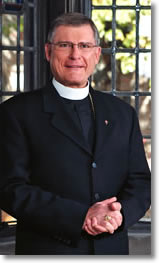by Rev. Jerry Kieschnick
 |
|
One of my favorite childhood songs, now included in the Lutheran Service Book (LSB 588), is “Jesus Loves Me.” Listen to the words:
“Jesus loves me! This I know, for the Bible tells me so. Little ones to Him belong; they are weak, but He is strong. Yes, Jesus loves me! Yes, Jesus loves me! Yes, Jesus loves me! The Bible tells me so.”
In simple words, this song says what the Bible is all about: the Good News that “in Christ God was reconciling the world to Himself, not counting their trespasses against them” (2 Cor. 5:19). In many ways and differing words, the message of the apostles and prophets in the Holy Spirit-inspired chapters and verses of the Old and New Testaments is the message of how God chose to deal with the cause of the separation between Himself and humanity—our sin.
The Holy Bible tells that story and how God’s forgiving grace in Jesus Christ makes it possible for men and women to live as forgiven children of the heavenly Father. The Bible speaks of how God interacts with people, through His Word and sacraments. Through these “means of grace,” we receive the forgiveness of our sin and are filled with the sure hope of eternal life with God after our sojourn on this earth has ended.
These truths are basic to all we believe, teach, and confess in The Lutheran Church—Missouri Synod, and they come only from God’s inspired, inerrant, infallible Word in Holy Scripture. Our Synod’s Constitution states this in these words: “The Synod, and every member of the Synod, accepts without reservation . . . the Scriptures of the Old and the New Testament as the written Word of God and the only rule and norm of faith and of practice” (Article II, Confession).
Nearly 450 years ago, our Lutheran forebears stated very clearly what they understood God’s Word to say about faith and life in the Book of Concord, which gathers into one volume “the Symbolical Books of the Evangelical Lutheran Church,” also known as the “Lutheran Confessions.” These confessional writings are the three “ecumenical creeds”— the Apostles’, Nicene, and Athanasian creeds—the Unaltered Augsburg Confession, the Apology of the Augsburg Confession, the Smalcald Articles, the Treatise on the Power and Primacy of the Pope, Luther’s Large and Small Catechisms, and the Formula of Concord.
Because these writings are drawn directly from and are fully in accord with the Word of God, our Synod accepts these Confessions “without reservation” as “a true and unadulterated statement and exposition of the Word of God,” as Article II of the Constitution states it.
Delegates to the 2007 Synod convention resolved (in Resolution 3-02) to encourage study of the Lutheran Confessions in preparation for the 500th anniversary of the Reformation in 2017. The convention resolved, “That in preparation for the celebration of this anniversary, the congregations and the called workers of the Synod be encouraged to conduct in-depth examination and study of the ecumenical creeds and Lutheran Confessions. . . .” That study will be supported and encouraged in numerous ways in the years ahead.
As we approach this year’s Synod convention, July 10–17 in Houston, we do so under the theme “ONE People—Forgiven.” That theme will be expressed in many ways, using many words, none more important than those in the second stanza of the song I shared at the beginning of this article:
“Jesus loves me! He who died, heaven’s gates to open wide. He has washed away my sin, lets His little child come in. Yes, Jesus loves me! Yes, Jesus loves me! Yes, Jesus loves me! The Bible tells me so.”
—
Jerry Kieschnick
John 3:16 –17
Lives Transformed through Christ, in Time . . . for Eternity!
e-mail: president@lcms.org
Web page: www.lcms.org/president




